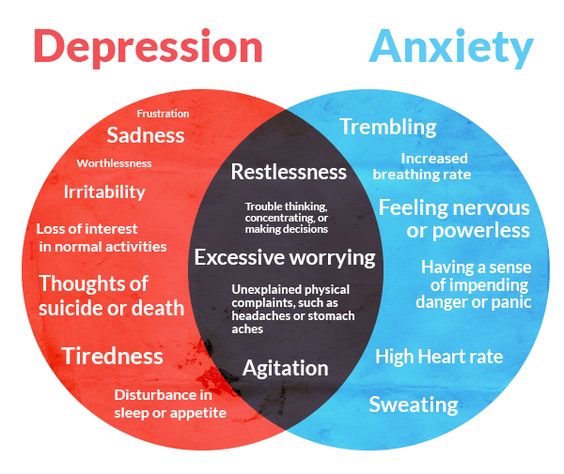The Complex Relationship Between Mental Health, Depression, and Anxiety
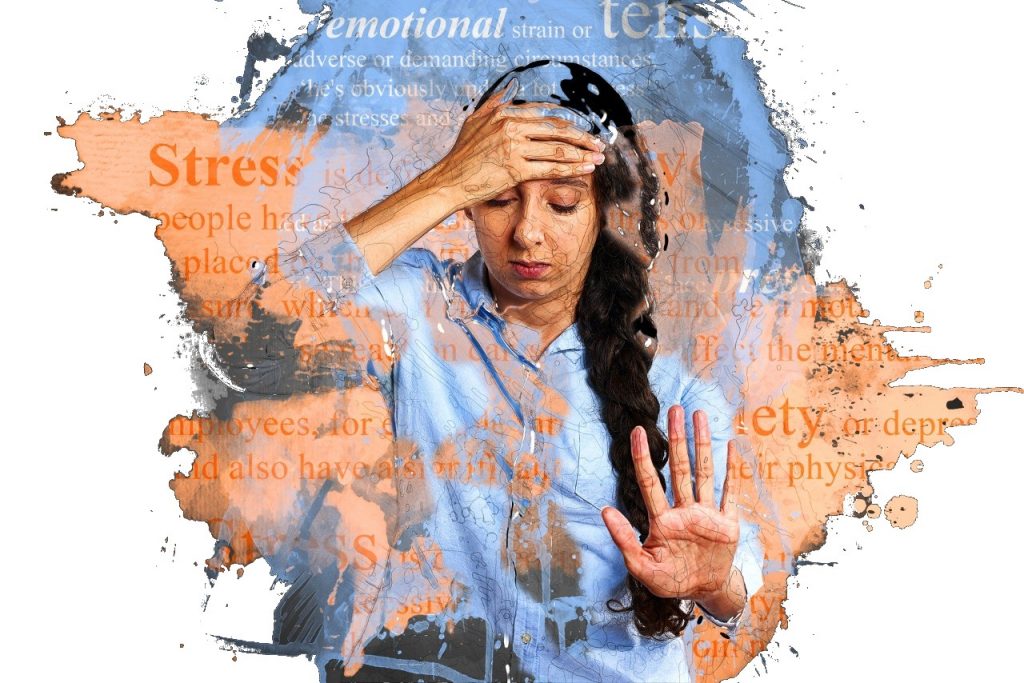
Introduction
In the quickly changing twenty-first century, mental health has become a major area of societal concern.
Anxiety and depression are common mental health issues that many people deal with on a daily basis as a result of the stresses of relationships, employment, and society expectations.
Despite being separate illnesses, these disorders are often linked together, resulting in a complicated web of symptoms that can be difficult to understand.
Comprehending the correlation among mental health, depression, and anxiety is imperative in formulating efficacious tactics to oversee and enhance psychological welfare
Comprehending Mental Health

The status of our emotional, psychological, and social well-being is referred to as our mental health.
It shapes our thoughts, emotions, and actions, impacting everything from our ability to cope with stress to our interpersonal relationships.
Numerous factors, such as genetics, life events, and a family history of mental health issues, can influence an individual’s mental health.
Being free from mental illness is not the only indicator of good mental health.
It entails having a positive self-perception, being able to handle everyday stressors, working efficiently, and giving back to the community.
But mental health can vary, and people can go through times when they feel anxious, depressed, or overwhelmed due to mental health issues.
Depression: A Comprehensive Overview of Signs and Symptoms
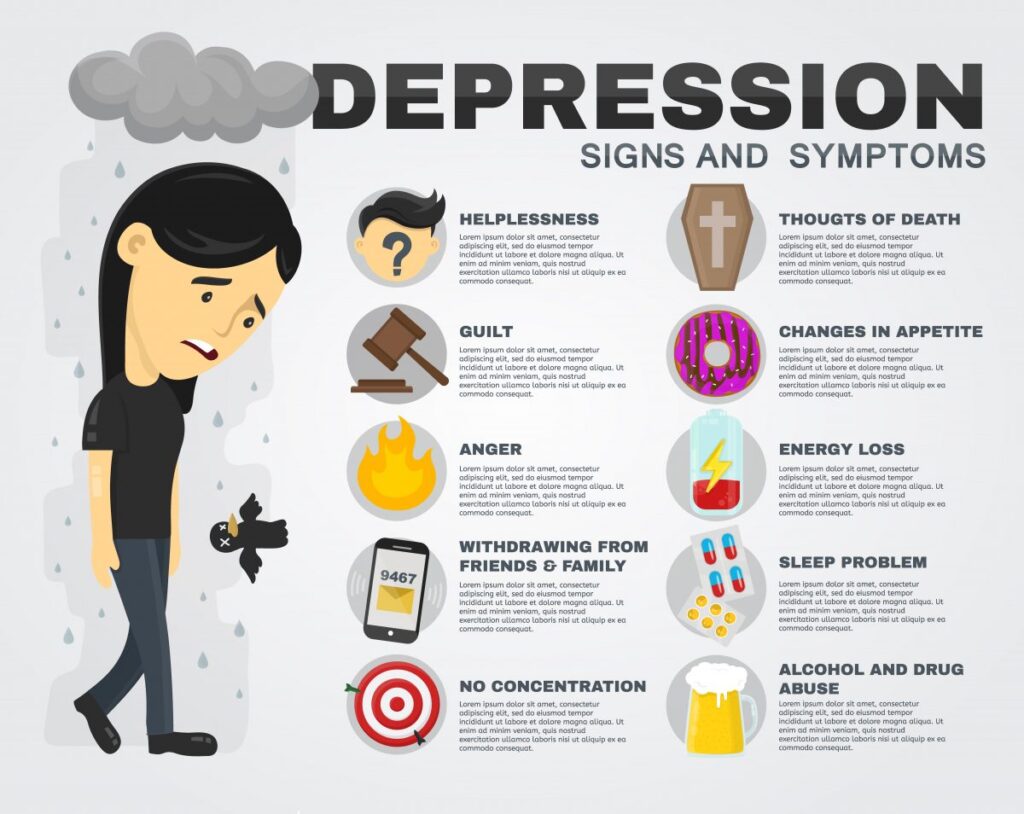
A frequent mental health condition called depression is characterised by enduring melancholy and pessimism as well as a loss of interest in or enjoyment from once-enjoyed activities.
It can result in a range of psychological and physical issues that impair a person’s capacity to operate both personally and professionally.
Although depressive symptoms can vary greatly, they frequently include:
Constantly feeling depressed, nervous, or “empty” emotions of despair or hopelessness
Intolerance remorse, worthlessness, or powerlessness loss of enjoyment or interest in pastimes and pursuits
Diminished vigour or exhaustion inability to focus, recall details, or make decisions
Oversleeping or insomnia Changes in appetite or weight
Causes of Depression: Suicidal or death-related thoughts Numerous factors, including genetic, biochemical, environmental, and psychological ones, might contribute to depression.
Typical triggers include the following:

Genetics: An increased chance of developing depression is associated with a family history of the illness.
Biochemical Factors: It is believed that imbalances in brain neurotransmitters such as dopamine and serotonin are a major cause of sadness.
Life Events: Depressive symptoms can be brought on by stressful or traumatic experiences including divorce, losing a loved one, or experiencing financial difficulties.
Personality: People who are easily stressed out or who have low self-esteem may be more prone to depression.
Medical Conditions: Medication side effects and chronic conditions like diabetes or heart disease can also exacerbate depression.
Anxiety: The Unceasing Feeling of Fear: Definition and Signs
Another common mental health issue is anxiety, which is typified by excessive concern, fear, or trepidation over ordinary occurrences.
While some anxiety is acceptable in stressful situations, persistent anxiety that interferes with day-to-day functioning is suggestive of an anxiety disorder.
Anxiety symptoms might include:

Anxiety or a tense feeling
being easily worn out
inability to focus or mental blankness
Intolerance
Tension in the muscles
Sleep problems include restless, unsatisfactory sleep, difficulty falling or staying asleep, and so on.
An abrupt, overwhelming sense of anxiety or discomfort known as a panic attack is frequently accompanied by physical symptoms such sweating, shaking, heart palpitations, or shortness of breath.
Reasons for Uncertainty
Similar to depression, anxiety is brought on by a number of things:
Genetic Predisposition: Anxiety disorders run in families can raise anxiety disorder risk.
Brain Chemistry: Anxiety may be exacerbated by abnormalities in neurotransmitters such gamma-aminobutyric acid (GABA), serotonin, and norepinephrine.
Environmental Factors: Trauma, tense situations in life, or significant life transitions can all cause anxiety.
A person may be more prone to anxiety if they possess specific personality qualities, such as being a perfectionist or having low self-esteem.
Medical Factors: Substances like alcohol and caffeine, as well as some medical disorders like hyperthyroidism, can make anxiety feelings worse.
The Relationship Between Anxiety and Depression
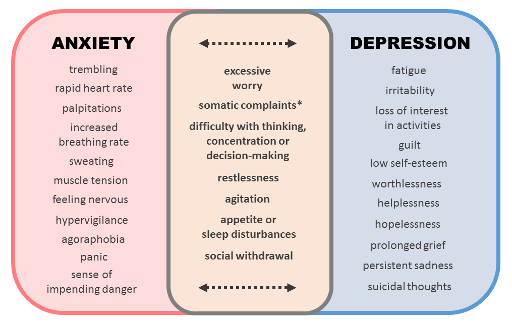
It’s common to speak to anxiety and depression as “two sides of the same coin.”
Even though they are separate conditions, they commonly coexist, putting those who are affected in a difficult and perplexing scenario. Studies reveal that around 50% of people with depressive diagnoses also have anxiety, and vice versa.
Similar Symptoms
It might be challenging to differentiate between anxiety and sadness due to their shared symptoms. As an illustration:
Fatigue: Excessive fatigue and a lack of energy can be brought on by either disease.
Sleep disturbances: Oversleeping or insomnia is frequently associated with anxiety and sadness.
Problems with Concentration: Both issues can manifest as difficulties focussing or coming to conclusions.
Anger and sadness can also seem as irritability, which frequently results in a feeling of being overburdened.
The Dangerous Loop
Anxiety and depression can have a vicious circle of interactions. Anxious people, for example, frequently worry about previous mistakes or future events, which can cause emotions of hopelessness and sadness and eventually lead to melancholy.
On the other hand, a person experiencing depression could feel so overwhelmed by their lack of drive and vitality that they start worrying unnecessarily about their capacity to handle things, which could result in anxiety.
Without the right care, this interaction can worsen symptoms, making it more difficult for people to escape the cycle.
The Effect on Day-to-Day Living
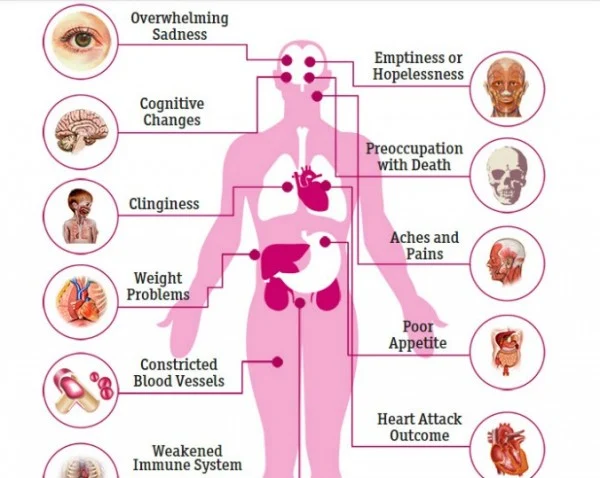
Anxiety and depression can both significantly affect day-to-day functioning. Relationships, productivity at work, and general quality of life may all be impacted.
Relationships: People who suffer from anxiety or depression may avoid social situations, which can make them feel alone and lonely. In addition, they could have trouble communicating, which makes it challenging to keep up positive relationships.
Work: Both situations may make it more difficult to focus, make decisions, or be productive. This could result in subpar work output, absenteeism, or even job termination.
Physical Health: Long-term stress brought on by anxiety and depression can result in heart disease, high blood pressure, and immune system weakness.
Strategies for Management and Treatment
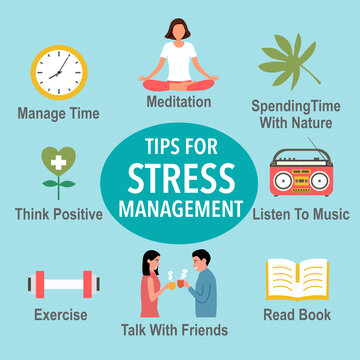
Combining different techniques is typically the key to effective treatment for anxiety and depression. The following tactics are frequently employed:
Psychoanalysis
For treating anxiety and depression, cognitive-behavioral therapy (CBT) is one of the best types of psychotherapy.
CBT assists people in recognising and altering harmful thought patterns and actions that fuel their symptoms. Dialectical behaviour therapy (DBT) and interpersonal therapy (IPT) are two more types of therapy that may be helpful.
Drugs
Prescriptions for antidepressants, such as selective serotonin reuptake inhibitors (SSRIs), are frequently given to treat anxiety and depression.
By regulating neurotransmitters in the brain, these drugs help reduce symptoms. Sometimes doctors will prescribe beta-blockers or benzodiazepines to treat severe anxiety symptoms temporarily.
Modifications in Lifestyle
Modifying one’s lifestyle can be quite important for controlling anxiety and sadness.
A balanced diet, enough sleep, regular exercise, and stress-reduction methods like yoga or mindfulness meditation can all assist to enhance mental health.
Assistive Systems
Strong networks of friends, family, or support groups can offer consolation on an emotional level as well as useful assistance in managing anxiety and depression.
Talking about your experiences with people who are sympathetic to your situation might help you feel less alone and give you useful advice on coping mechanisms.
Techniques for Relaxation and Mindfulness

Deep breathing exercises, gradual muscle relaxation, and meditation are examples of mindfulness techniques that can help elevate mood and lessen anxiety.
By encouraging present-moment awareness, these approaches can assist in interrupting the negative thought pattern linked to anxiety and depression.
In summary
Anxiety, depression, and mental health have a complicated and nuanced relationship. These illnesses frequently overlap, resulting in a difficult cycle of symptoms that can seriously lower someone’s quality of life.
Nonetheless, people may control their symptoms, enhance their mental health, and enjoy happy lives with the right care and assistance.
It is crucial for medical professionals as well as those impacted by depression and anxiety to comprehend the subtleties of the interactions between these two disorders.
We can work towards a future where mental health is prioritised and people may thrive, free from the crippling affects of sadness and anxiety, by increasing awareness and encouraging efficient treatment options.
